- Home
- Quizzes
- My Quiz Activity
- Newsletters
- Sports Betting
- MY FAVORITES
- Add Sports/Teams
- SPORTS
-
NFL
- NFL Home
- Arizona Cardinals
- Atlanta Falcons
- Baltimore Ravens
- Buffalo Bills
- Carolina Panthers
- Chicago Bears
- Cincinnati Bengals
- Cleveland Browns
- Dallas Cowboys
- Denver Broncos
- Detroit Lions
- Green Bay Packers
- Houston Texans
- Indianapolis Colts
- Jacksonville Jaguars
- Kansas City Chiefs
- Las Vegas Raiders
- Los Angeles Chargers
- Los Angeles Rams
- Miami Dolphins
- Minnesota Vikings
- New England Patriots
- New Orleans Saints
- New York Jets
- New York Giants
- Philadelphia Eagles
- Pittsburgh Steelers
- San Francisco 49ers
- Seattle Seahawks
- Tampa Bay Buccaneers
- Tennessee Titans
- Washington Commanders
-
MLB
- MLB Home
- Arizona Diamondbacks
- Atlanta Braves
- Baltimore Orioles
- Boston Red Sox
- Chicago White Sox
- Chicago Cubs
- Cincinnati Reds
- Cleveland Guardians
- Colorado Rockies
- Detroit Tigers
- Houston Astros
- Kansas City Royals
- Los Angeles Angels
- Los Angeles Dodgers
- Miami Marlins
- Milwaukee Brewers
- Minnesota Twins
- New York Yankees
- New York Mets
- Oakland Athletics
- Philadelphia Phillies
- Pittsburgh Pirates
- San Diego Padres
- San Francisco Giants
- Seattle Mariners
- St. Louis Cardinals
- Tampa Bay Rays
- Texas Rangers
- Toronto Blue Jays
- Washington Nationals
-
NBA
- NBA Home
- Atlanta Hawks
- Boston Celtics
- Brooklyn Nets
- Charlotte Hornets
- Chicago Bulls
- Cleveland Cavaliers
- Dallas Mavericks
- Denver Nuggets
- Detroit Pistons
- Golden State Warriors
- Houston Rockets
- Indiana Pacers
- Los Angeles Clippers
- Los Angeles Lakers
- Memphis Grizzlies
- Miami Heat
- Milwaukee Bucks
- Minnesota Timberwolves
- New Orleans Pelicans
- New York Knicks
- Oklahoma City Thunder
- Orlando Magic
- Philadelphia 76ers
- Phoenix Suns
- Portland Trail Blazers
- Sacramento Kings
- San Antonio Spurs
- Toronto Raptors
- Utah Jazz
- Washington Wizards
-
NHL
- NHL Home
- Anaheim Ducks
- Arizona Coyotes
- Boston Bruins
- Buffalo Sabres
- Calgary Flames
- Carolina Hurricanes
- Chicago Blackhawks
- Colorado Avalanche
- Columbus Blue Jackets
- Dallas Stars
- Detroit Red Wings
- Edmonton Oilers
- Florida Panthers
- Los Angeles Kings
- Minnesota Wild
- Montreal Canadiens
- Nashville Predators
- New Jersey Devils
- New York Islanders
- New York Rangers
- Ottawa Senators
- Philadelphia Flyers
- Pittsburgh Penguins
- San Jose Sharks
- Seattle Kraken
- St. Louis Blues
- Tampa Bay Lightning
- Toronto Maple Leafs
- Vancouver Canucks
- Vegas Golden Knights
- Washington Capitals
- Winnipeg Jets
- NCAAF
- NCAAM
- Boxing
- Entertainment
- Lifestyle
- Golf
- MMA
- Soccer
- Tennis
- Wrestling
- More Sports
- RESOURCES
- My Account
- YB on Facebook
- YB on Twitter
- YB on Flipboard
- Contact Us
- Privacy Policy
- Terms of Service
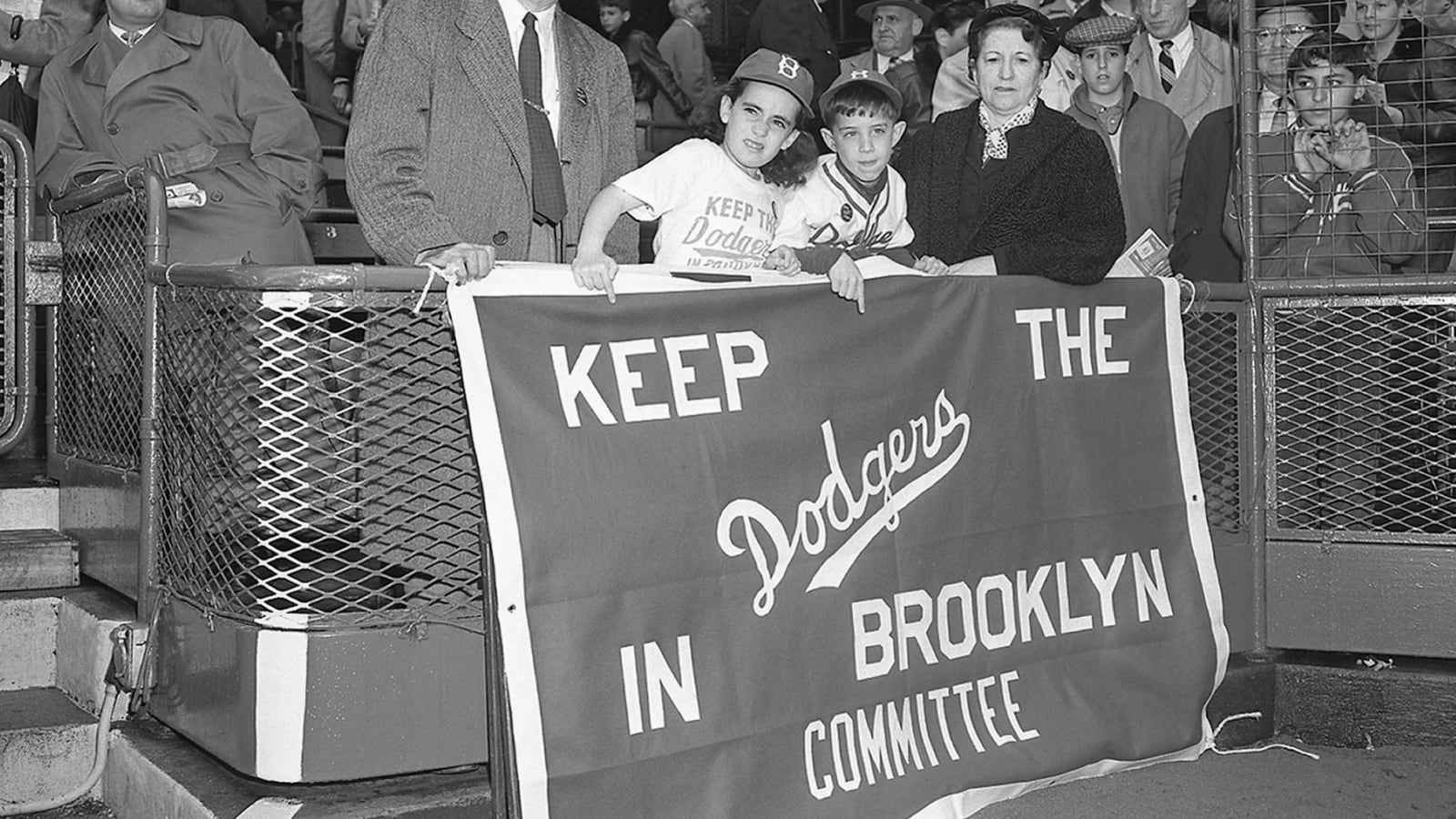
Cities that have infamously lost sports franchises
Numerous franchises have made seminal decisions to relocate in the past several decades, with many such moves altering the complexions of leagues. Here's a look at the most pivotal decisions that changed cities and some that had big impacts on the futures of their respective leagues.
1946: Rams move from Cleveland to L.A.
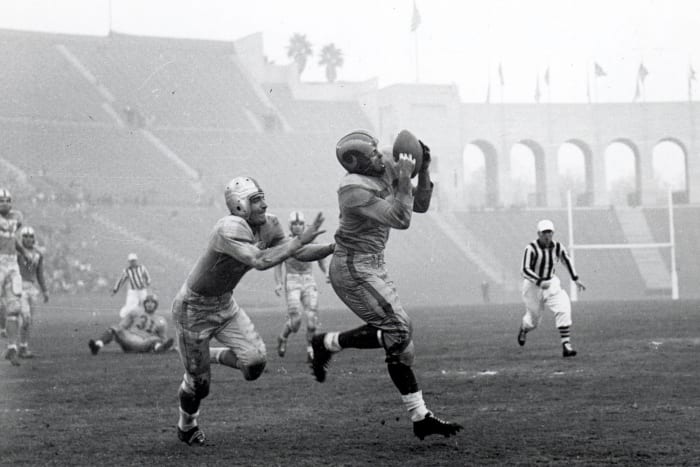
The first major expansion to Los Angeles, this was also the first of three relocations for the Rams. Their first provided a groundbreaking moment. The Cleveland Rams won the 1945 NFL championship, but owner Dan Reeves moved the franchise to southern California a month after the team's only title in Cleveland. The Rams, who made northeast Ohio their home for nine years, developed a rivalry with the new Cleveland franchise -- the Browns -- once the latter joined the NFL in 1950. Cleveland and L.A. met three times in the NFL title game between 1950 and '55, and Otto Graham's Browns won two of those games.
1953: Braves leave Boston to head to Milwaukee
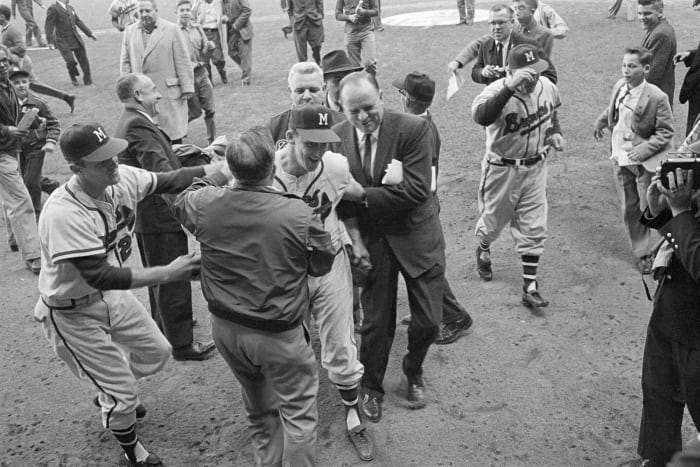
Prior to the Braves ditching Boston for Milwaukee, Major League Baseball enjoyed incredible consistency. No team had moved in the previous 50 years, nor had any expansion taken place. Also known as the Red Stockings, Beaneaters, Doves, Rustlers and Bees, the franchise played in Boston for 76 years. The Braves won one World Series in Boston and one in Milwaukee, the latter effort buoyed by Warren Spahn and a young Hank Aaron in 1957.
1958: New York loses Dodgers and Giants to Cali

On May 28, 1957, owners voted unanimously to allow both the Brooklyn Dodgers and New York Giants to relocate to California. The Dodgers were a National League dynasty with strong attendance figures, while the Giants had encountered some financial turmoil. This measure required both teams to move, and both did. Both franchises began the 1958 season in their current homes. This move devastated many New York baseball fans, but it represented the first California infiltration for the country's most popular sport at the time.
1960: Lakers leave 'Land of 10,000 Lakes' behind

The most successful of the Los Angeles franchises made the move west after considering Chicago and San Francisco for its new operations base. The Lakers moved after establishing a dynasty in Minneapolis, spawning in 1947 and winning five of the first six NBA championships. However, attendance suffered following George Mikan's 1956 retirement. The L.A. departure occurred despite the Lakers being purchased by a Minneapolis-based ownership group, and it set the course for multiple future Lakers dynasties.
1962: Warriors make cross-country move away from Philadelphia
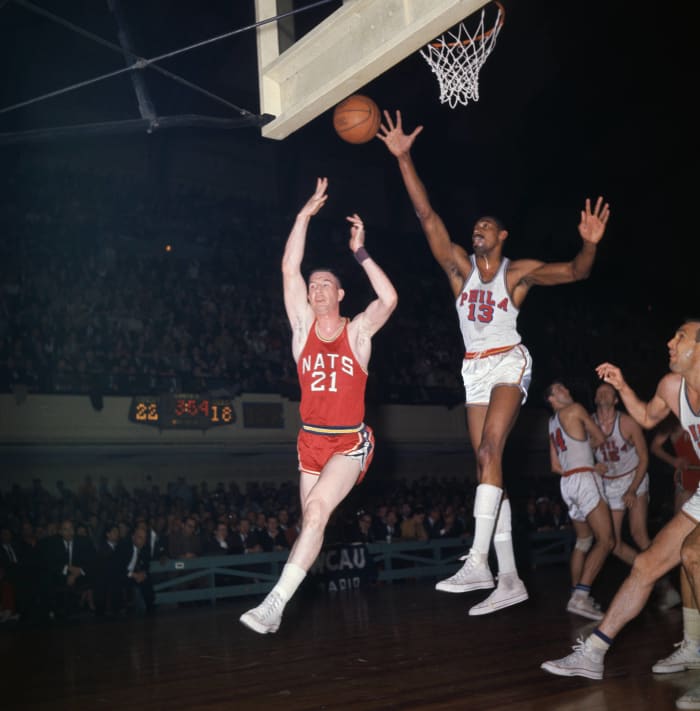
Employing one of the NBA's all-time greats in Philadelphia native Wilt Chamberlain, the Warriors nevertheless moved to San Francisco prior to the 1962-63 season. The big man's dominance did not stop owner Eddie Gottlieb from selling the team to a Bay Area businessman in 1962, and the franchise wasted no time in skipping town. Chamberlain played three seasons with the Philadelphia Warriors, who could not topple the Celtics, and three in northern California. But Philly acquired the Syracuse Nationals in 1963, becoming the 76ers, and landed Chamberlain via trade in 1965.
1966: Milwaukee loses Braves to the Southeast
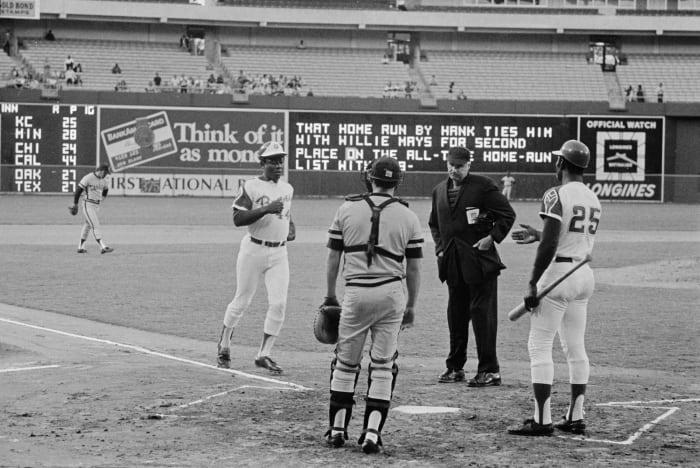
Prior to the Braves' Milwaukee exit, baseball had not ventured to the Southeast. This marked a big year for Atlanta, with the Falcons debuting in 1966 as well. Despite featuring consistently competitive teams, the Milwaukee Braves saw attendance decline in the 1960s. The city's desire to retain the team induced a messy legal battle, but the Braves moved for the second time in 13 years. However, the Seattle Pilots relocated to Milwaukee in 1970, became the Brewers and forged long-term MLB stability in Wisconsin.
1968: NBA basketball leaves St. Louis behind
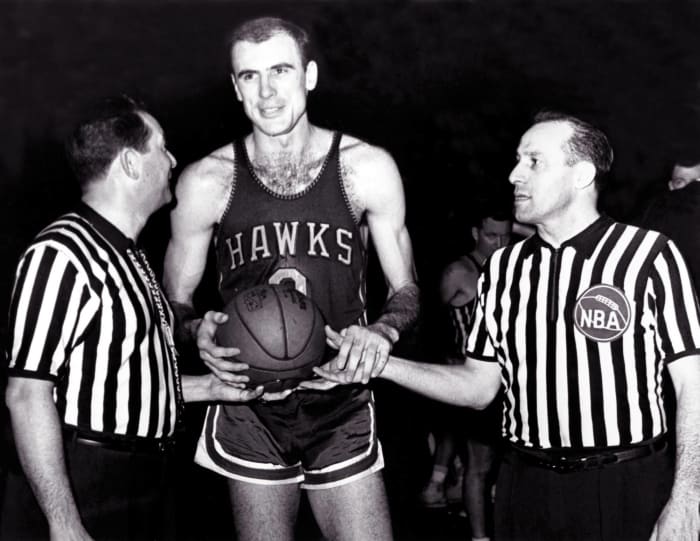
After moving from Milwaukee to St. Louis in 1955, the Hawks delayed the Boston Celtics' dynasty by winning the 1958 NBA title. And Bob Pettit-centered rosters made three other Finals trips from 1957-61. But, as is the case with many exits, the Hawks' owner, Bob Kerner, sold the team to a group based elsewhere. A move to Atlanta swiftly commenced to end a 13-season run. Although St. Louis had an ABA team for two years, it has not been a pro basketball city in four-plus decades.
1972: Nation's capital loses national pasttime
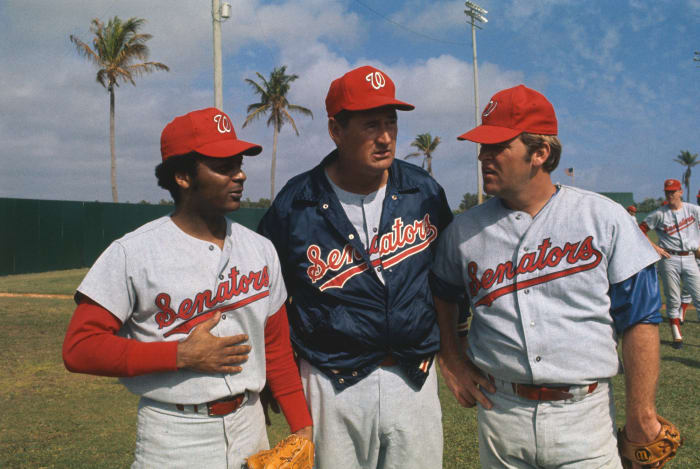
The Washington Senators enjoyed an interesting existence, moving twice to form two of today's AL teams. Their first iteration lasted 60 years before it morphed into the Minnesota Twins in 1961. Granted an expansion team that same year, Washington only managed to keep it for 11 seasons. Senators 2.0 enjoyed just one winning season. The team received approval to move to Texas -- where it would become the Rangers -- during the 1971 season. On the season's final day — which turned out to be D.C.'s last baseball game for 34 years — a near-riot ensued at RFK Stadium to force a Senators forfeit despite the team holding a ninth-inning lead.
1972: Basketball ditches Cincy for the Midwest
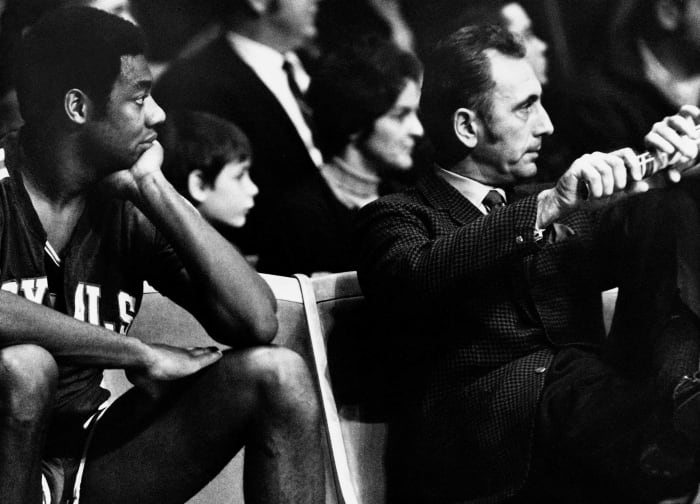
When the Cincinnati Royals left their market of 15 seasons, major professional sports briefly voyaged to Nebraska. Omaha became the Kings' part-time home for three seasons in the early 1970s, sharing the team with Kansas City, before the franchise settled exclusively in western Missouri in 1975. Renamed the Kings to avoid confusion with the Kansas City Royals, the franchise did battle the Lakers in the 1981 Western Conference Finals, but its best days came in Cincinnati, when Oscar Robertson dazzled for 10 seasons before being traded to the Bucks.
1978: San Diego gets second NBA chance at Buffalo's expense
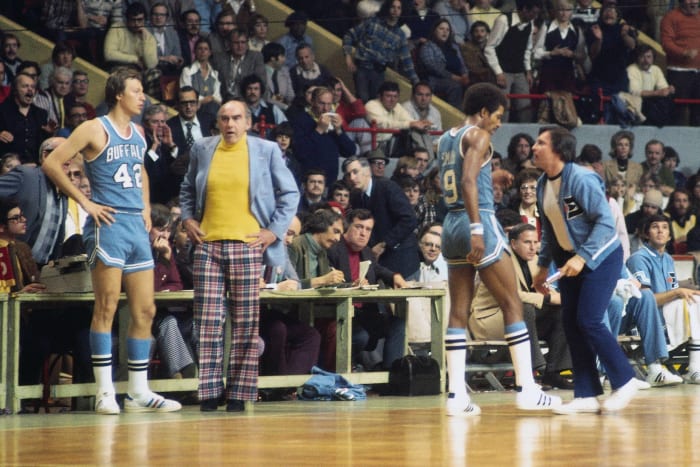
The Buffalo Braves lasted just eight years despite a decent stretch in the mid-1970s, but the San Diego market did not succeed when the franchise was given a second chance. The Rockets began their run with four seasons in San Diego (1967-71) before moving to Houston. The Braves became the Clippers upon venturing west and won more than 40 games in San Diego just once before heading to Los Angeles in 1984. The Braves initially relocated because Celtics owner and L.A. native Irv Levin and Braves owner John Y. Brown traded franchises in June 1978. Seriously.
1979: Jazz leave Big Easy for Salt Lake
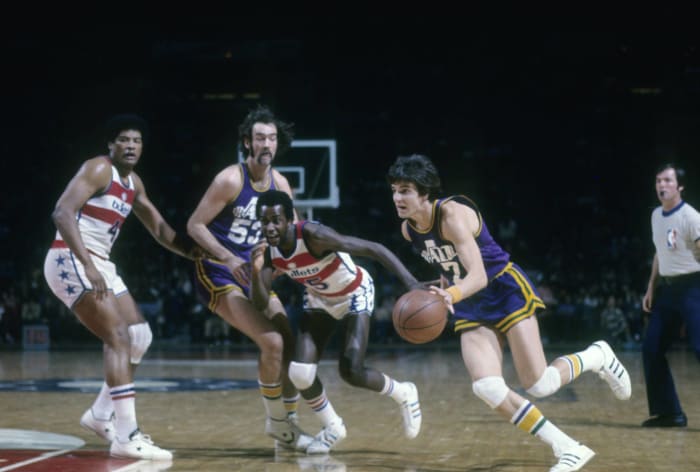
The Utah Jazz once made the playoffs in 20 consecutive seasons. However, Utah's foray into major pro sports did not happen until New Orleans lost the Jazz after five lean years in the '70s. The Jazz roved between venues that did not end up suiting them, including the Superdome, and never won 40 games in a season. However, the New Orleans Jazz deployed legendary scorer Pete Maravich in all five seasons. The LSU product won the 1976-77 scoring title. Otherwise, the Jazz's pre-Utah stay was largely forgettable.
1982: Raiders controversially move south from Oakland to L.A.

In one of the more infamous departures in sports history, Al Davis moved the Raiders against the NFL's will. The maverick owner ignited a years-long feud with commissioner Pete Rozelle by bolting from Oakland in 1982 — barely a year after the Raiders won Super Bowl XV — without permission. This led to a notorious court battle, which Davis won, and an awkward scene when Rozelle had to hand the Los Angeles Raiders owner the Vince Lombardi Trophy after the Silver and Black routed the Redskins in Super Bowl XVIII.
1982: Hockey heads from Denver to Jersey
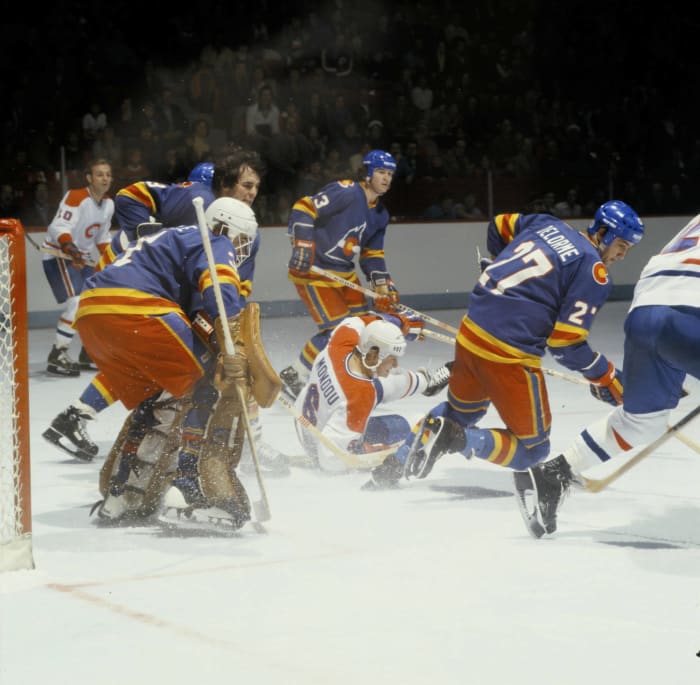
A franchise that had already left Kansas City for Denver in the mid-1970s relocated again in 1982 because of financial issues. Neither the Kansas City Scouts nor the Colorado Rockies boasted a formidable operation, with the franchise topping out with 22 wins in its pre-New Jersey days. Renamed the Devils, the franchise found its footing in New Jersey in the late '80s and has three Stanley Cups in its trophy case.
1984: Colts bolt Baltimore in the cover of darkness
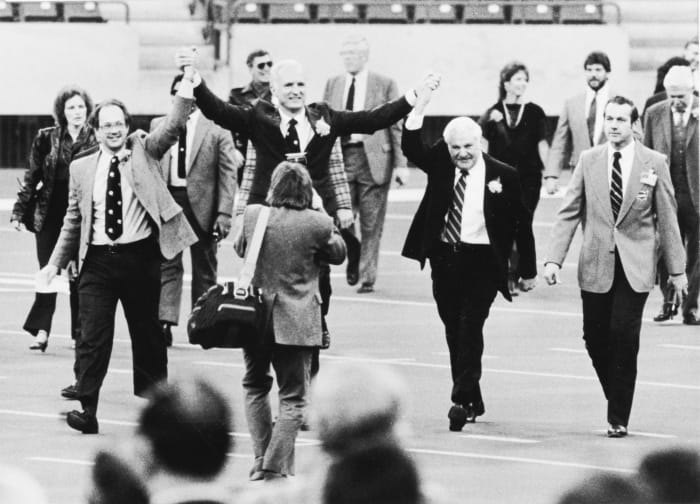
One of the ugliest exits in relocation history, the Colts moved from Baltimore to Indianapolis in secret one night in March 1984. After negotiating with multiple cities, including Phoenix, that winter, Colts owner Robert Irsay chose an Indianapolis offer centered around the Hoosier Dome. Coach Frank Kush and current owner Jim Irsay were part of a Colts group to inspect the stadium using fake names. Al Davis' ongoing fight with the NFL about the Raiders' move gave Irsay cover, with Pete Rozelle saying the NFL would not contest a Colts defection, and Baltimore suddenly was without a team one morning.
1985: Kings leave Kansas City behind
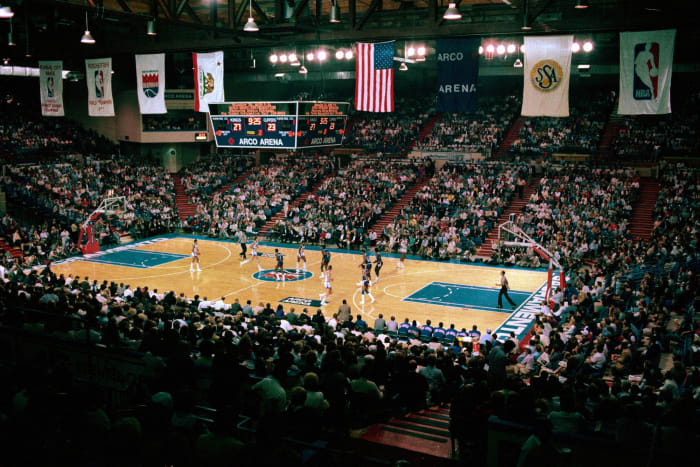
This franchise has moved three times, the most recent coming in 1985. A Sacramento-based ownership group bought the Kings in 1983, and although the new owners repeatedly insisted they wanted to keep the team in Kansas City, a quick exit followed. On the same day Kansas City submitted a team-friendly lease offer in January 1985, the Kings filed paperwork with the NBA to move to northern California. The Kings resided behind the Royals and Chiefs in K.C.'s sports pecking order; this marked the first major pro sports imprint in Sacramento.
1988: St. Louis goes from two Cardinals teams to one

Sharing a stadium (and a name) with baseball's St. Louis Cardinals, the NFL's team enjoyed an unremarkable 28-year run after moving from Chicago to eastern Missouri in 1960. During the 1987 season, owner Bill Bidwill considered moves to Baltimore and Jacksonville before deciding on Phoenix in January 1988. Interestingly, Bidwill's franchise moved from a baseball stadium to a college football stadium, going from Busch Stadium to sharing Arizona State's Sun Devil Stadium for 18 years prior to the Cards' current digs opening in 2006.
1993: Stars move from Minnesota to — Dallas?
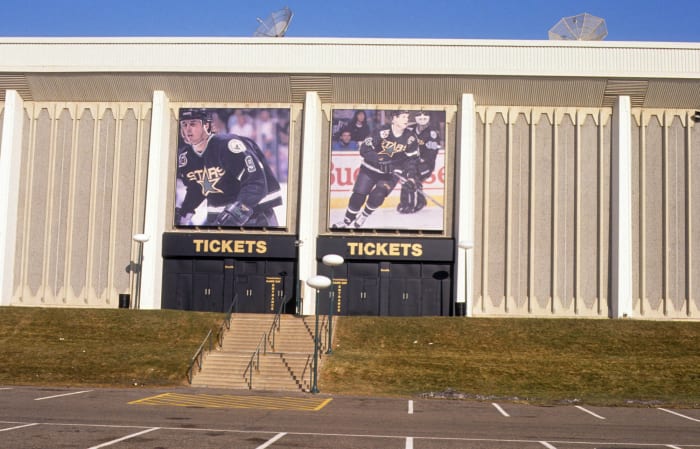
After nearly three decades in the Twin Cities, the Minnesota North Stars left for Dallas. This began a trend of NHL teams leaving Northern cities for Southern locales. Although the North Stars advanced to two Stanley Cup Finals, one via a Cinderella run in 1991, they failed to turn an annual profit for nearly an entire decade prior to their move. Dallas got over the hump with a title in 1999. Minnesota's expansion squad, the Wild, began play in 2000.
1995: NFL abandons Hollywood

A three-month span in 1995 stripped Los Angeles of both of its football teams. The Rams first left for St. Louis, and the Raiders then committed to come back to Oakland. Rams attendance had declined as the team worsened following largely successful 1970s and '80s runs, and then-owner Georgia Frontiere sold part of the team to Stan Kroenke. St. Louis also had a stadium plan in place. This ended a 49-year stay in L.A. for the Rams. The Raiders merely moved back into the Oakland Coliseum they'd vacated in 1982.
1995: Hockey moves to the Rockies at Quebec's expense

An original World Hockey Association franchise, the Quebec Nordiques played 16 NHL seasons. They bottomed out with a rough stretch in the early 1990s but assembled a budding contender thanks to maneuvers made with some of the high draft picks. However, that merely set up the Colorado Avalanche to field a dynasty. Sold to a group that moved the team to Denver, the franchise won a Stanley Cup in its first year as the Avalanche and claimed another five years later.
1996: Modell leaves Browns name behind but takes franchise to Baltimore
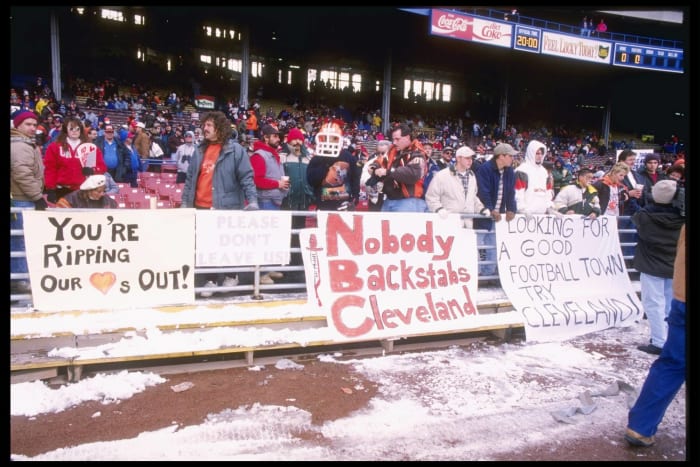
Seeing the Cavaliers and Indians open new venues, Art Modell sought one for his Browns. Cleveland promised to renovate Municipal Stadium, the Browns' home in their first stay in the city, but Modell instead accepted an offer from Baltimore. The owner once forgiven for firing Paul Brown and leading Jim Brown to retirement announced this move in November 1995, and the lame-duck Browns games featured historic fan vitriol. While the Browns respawned in 1999, they have fared far worse than Browns 1.0 did or the Ravens have.
1996: Jets leave Winnipeg, become Coyotes

The Winnipeg Jets enjoyed a 17-year run in the top hockey league. While they re-emerged in 2011, this continued hockey's southward expansion after the North Stars and Nordiques left their cities. Like many teams on this list, the Jets experienced steady financial troubles. A group that included then-Suns executive Jerry Colangelo bought the Jets and rebranded them as the Phoenix Coyotes, only the move out of Canada did not occur until after a depressing lame-duck season.
1997: Oilers leave Houston, head to Music City
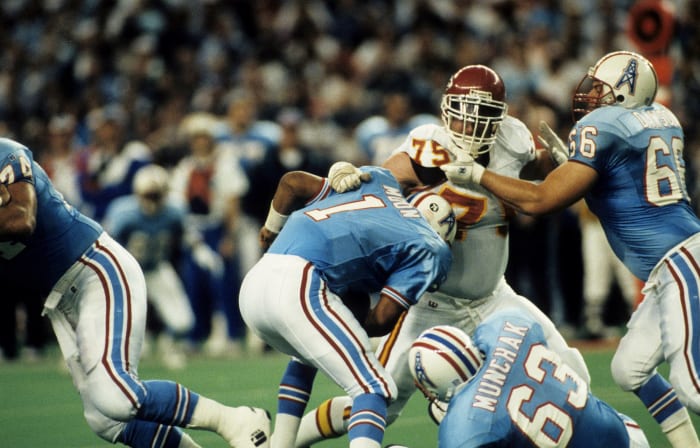
After the Ravens and Rams secured stadium deals, Houston Oilers owner Bud Adams sought an Astrodome replacement. The Oilers advanced to seven straight postseasons from 1987-93 but went 2-14 in 1994 after trading Warren Moon. Scant support for a new stadium came. Nashville secured public funding for a venue, and the Oilers received permission to relocate in 1996. The franchise played a lame-duck Houston season in '96 and two transition slates in college venues as the Tennessee Oilers before turning to the Titans moniker in a new stadium in 1999. The franchise's only Super Bowl berth followed months later.
1997: Hartford loses the Whalers

While Winnipeg and Colorado saw hockey return after initially losing their teams, Hartford has not. Connecticut remains without a big-four franchise as a result of the Hartford Whalers turning into the Carolina Hurricanes 21 years ago. Issues centering on their home arena caused the Whalers to trek south. The Hurricanes managed to claim a Stanley Cup, which eluded the Whalers in 18 seasons.
2001: Grizzlies migrate from Vancouver to warmer climate

The NBA's Canada expansion was a two-pronged effort in 1995, but Vancouver's chapter is barely a footnote. The Grizzlies lasted just six seasons in western Canada. The Vancouver years did not produce an all-star or a playoff berth, and the Grizzlies won just 28 percent of their games while there. In the Grizzlies' first Memphis year, Pau Gasol and Shane Battier arrived. The now-Tennessee-based franchise booked 10 postseason berths in its first 17 years post-move.
2005: Montreal's baseball loss is D.C.'s gain

The Expos relocated to Washington, D.C., after 35 years in Montreal. Events from the previous decade played a key role in this unraveling. The Expos' best chance at a World Series came in 1994, when they boasted baseball's best record (74-40) that August. But the players' strike ended the season. The franchise never recovered. The Expos became a contraction candidate before Major League Baseball took over the team, and after the 2004 season, they morphed into the Nationals. The franchise, which went 1-for-35 in playoff berths in Montreal, won its first World Series in 2019.
2008: OKC takes NBA from Seattle
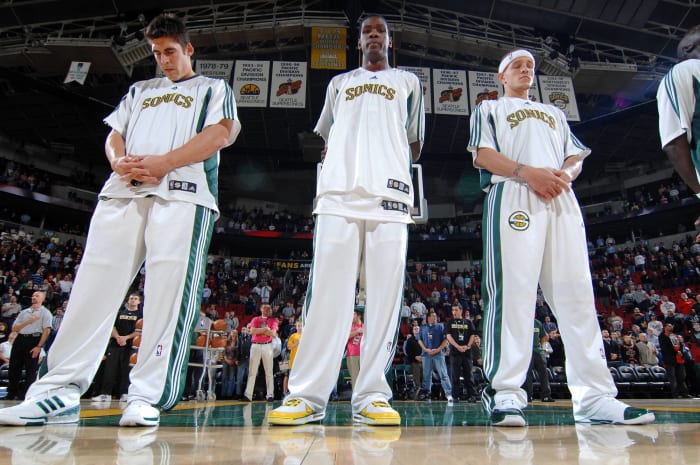
After 41 years in Seattle, which included an NBA title and two Finals appearances, the SuperSonics bolted for Oklahoma City in ugly fashion. Oklahoma City-based businessman Clay Bennett bought the Sonics in 2006 and aggressively tried to move them to his home state. In less than a year, the new ownership proceeded on course. The Sonics, who drafted Kevin Durant second overall in 2007, played the 2007-08 season knowing they were on their way out of town. Durant won Rookie of the Year honors but played just one season in Seattle.
2011: NHL leaves Atlanta again, returns to Winnipeg

Reversing a years-long trend, hockey returned to a Northern city. However, it came at the expense of a Southern locale that had been through this before. Atlanta has now seen two teams defect to Canadian towns. The Atlanta Flames left in 1980 and have resided in Calgary since, and the Thrashers — an expansion team in 1999 — are now north of the border as well. This resulted in the Winnipeg Jets respawning, 15 years after the original version left for Arizona. Atlanta's second franchise made the playoffs just once in 12 seasons before relocating.
2016: NFL leaves St. Louis in the dust again

A three-franchise pursuit of Los Angeles came to a head in January 2016, when NFL owners preferred the Rams' proposal to the Chargers' and Raiders' joint venture. The Rams relocated for a third time, moving back to their longtime home after a 21-season St. Louis stay. St. Louis lost its NFL team for a second time, and the Rams — whose "Greatest Show on Turf" years gave way to 12 playoff-less seasons at the end of their St. Louis run — stormed back to postseason play under Sean McVay in 2017 and played in Super Bowl LIII a year later. After four seasons in the L.A. Coliseum, the Rams moved into SoFi Stadium in 2020.
2017: Chargers bolt San Diego for Tinseltown

When the Rams were chosen to be the NFL's 21st-century Los Angeles guinea pig, the Chargers were given a year to decide if they would follow. After a measure for a downtown San Diego stadium failed at the ballot box in November 2016, the Chargers bolted their 55-year home. The Bolts began in Los Angeles in 1960 but moved south in '61. Charger apathy has ensued since their most recent move. The team spent three years playing in a soccer stadium — which became flooded with opposing teams' colors for most of the Chargers' home games — but moved into SoFi Stadium with the Rams in 2020.
2020: Raiders flee from Oakland yet again

For the third time in 35 years, the Raiders relocated. After 25 seasons back in Oakland -- the final three as a lame-duck franchise -- the Raiders become the second major pro sports team in Las Vegas in a five-year span, following the NHL's Golden Knights. Raiders owner Mark Davis broke off stadium talks with Oakland and zeroed in on Las Vegas, where he secured an NFL-record $750 million in public funding for the $1.8 billion Allegiant Stadium. The Raiders, who received NFL approval to leave Oakland this time, are the only team in major American sports history to leave their original market twice.
Sam Robinson is a Kansas City, Mo.-based writer who mostly writes about the NFL. He has covered sports for nearly 10 years. Boxing, the Royals and Pandora stations featuring female rock protagonists are some of his go-tos. Occasionally interesting tweets @SRobinson25.
More must-reads:
- Watch: Joe Burrow continues his road to recovery in offseason workouts
- Timberwolves' stifling defense compared to Bad Boy era Pistons
- The 'Leading scorers from the 1992-93 NBA season' quiz
Breaking News
Customize Your Newsletter
 +
+
Get the latest news and rumors, customized to your favorite sports and teams. Emailed daily. Always free!
Use of this website (including any and all parts and
components) constitutes your acceptance of these
Terms of Service and Privacy Policy.

